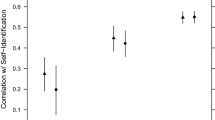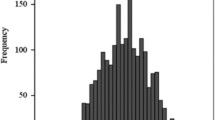Abstract
Recent research suggests that fiscally conservative policy preferences and disapproval of President Obama are significant predictors of Tea Party membership (Maxwell and Parent 2012). Unfortunately, however, we know very little about the reasons why Tea Party members so aggressively disapprove of President Obama. While Tea Party members adamantly deny that President Obama’s race plays any role in their motivations, their critics argue that racial attitudes are a primary reason why individuals choose to join the movement. In this article, using national survey data conducted by Knowledge Networks (n = 1649), we explore the possibility that three unique racial attitudes have been influential in the establishment of the Tea Party. Specifically, we investigate the role of symbolic racism, racial stereotypes, and ethnocentrism as predictors of self-identified Tea Party membership among whites.
Similar content being viewed by others
Notes
The ethnocentrism measure developed by Kinder and Kam does include additional out-groups. However, since this sample only included respondents who identified as white, African American, or Latino, we limited our measure accordingly.
We conducted a series of nested models omitting one racial scale at a time in order to verify that only ethnocentrism significantly improved the overall fit of the model. Likelihood ratio tests indicate that a slightly significant reduction in overall fit accompanied the omission of ethnocentrism (LR χ 2 = 1.79, p ≤ 0.1), but only in a one-tailed test of significance. Dropping the other racial scales did not significantly reduce the fit of the model.
References
Brezina, T., & Winder, K. (2003). Economic disadvantage, status generalization, and negative racial stereotyping by white Americans. Social Psychology Quarterly, 66(4), 402–418.
Cribbs, S. E., & Austin, D. M. (2011). Enduring pictures in our heads: The continuance of authoritarianism and racial stereotyping. Journal of Black Studies, 42, 334–359.
Ford, P. K., Maxwell, A., & Shields, T. (2010). What’s the matter with Arkansas? Symbolic racism and 2008 presidential candidate support. Presidential Studies Quarterly, 40(2), 286–300.
Fraser, S. & Freeman, J. B. (2010). In the rearview mirror: History’s mad hatters: The strange career of Tea Party populism. New Labor Forum. 19(3) (Fall), 75–81.
Growing number of Americans say Obama is a Muslim: Religion, politics and the president. (2010, August 19). Pew research center for the people and the press. Retrieved on May 15, 2011 from http://people-press.org/2010/08/19/growing-number-of-americans-say-obama-is-a-muslim/.
Henry, P. J., & Sears, D. O. (2002). The symbolic racism 2000 scale. Political Psychology, 23(2), 253–283.
Hutchings, V. L., & Valentino, N. A. (2004). The politics of race: Understanding the importance of interests and values in the racial attitudes literature. Annual Review of Political Science, 7, 383–408.
Kinder, D. R., & Kam, C. D. (2009). Us against them: Ethnocentric foundations of American opinion. Chicago: University of Chicago Press.
Kinder, D. R., & Sears, D. O. (1981). Prejudice and politics: Symbolic racism versus racial threats to the good life. Journal of Personality and Social Psychology, 40(3), 414–431.
Kluegel, J. R. (1990). Trends in whites’ explanations of the black-white gap in socioeconomic status, 1977–1989. American Sociological Review, 55, 512–525.
Krysan, M. (2000). Prejudice, politics, and public opinion: Understanding the sources of racial policy attitudes. Annual Review of Sociology, 26(1), 135–168.
Levine, J., Carmines, E. G., & Sniderman, P. (1999). The empirical dimensionality of racial stereotypes. Public Opinion Quarterly, 63, 371–384.
Measuring Barack Obama’s Patriotism (2008). My week: US Opinion. Retrieved May 15, 2011 from http://mobile.theweek.com/article/index/40740/www.aolnews.com.
National Survey of Tea Party Supporters (2010). New York Times and CBS Poll. Retreived December 20, 2011 from http://documents.nytimes.com/new-york-timescbs-news-poll-national-survey-of-tea-party-supporters.
Parker, C. S. (2011). 2010 multi-state survey of race and politics. University of Washington Institute for the study of ethnicity, race, and sexuality. Retrieved May 7, 2012 from http://depts.washington.edu/uwiser/racepolitics.html.
Pasek, J., et al. (2009). Determinants of turnout and candidate choice in the 2008 presidential election: Illuminating the impact of racial prejudice and other considerations. Public Opinion Quarterly, 73(5), 943–994.
Pease, D. E. (2010). States of fantasy: Barak Obama versus the Tea Party movement. Boundary 2. 37(2) (Summer), 89–105.
Peffley, M., Hurwitz, J., & Sniderman, P. M. (1997). Racial stereotypes and whites’ political views of blacks in the context of welfare and crime. American Journal of Political Science, 41(1) (January), 30–60.
Quraishi, J. (2010, September 28). More signs of Tea Party racism? Mother Jones. Retrieved on December 20, 2011 from http://motherjones.com/slideshows/2010/09/tea-partys-racist-signs/imam-obama.
Rasmussen, S., & Schoen, D. (2010). Mad as hell: How the Tea Party movement is fundamentally remaking our two-party system. New York: Harper Collins.
Robinson, E. (2010, November 2). Racism and the Tea Party movement. RealClearPolitics. Retrieved on December 20, 2011 from http://www.realclearpolitics.com/articles/2010/11/02/race_and_the_tea_partys_ire_107805.html.
Sears, D. O., & Henry, P. J. (2003). The origins of symbolic racism. Journal of Personality and Social Psychology, 85(2), 259–275.
Sears, D. O., & Henry, P. J. (2005). Over thirty years later: A contemporary look at symbolic racism and its critics. Advances in Experimental Social Psychology, 37, 95–150.
Sears, D. O., Henry, P. J., & Kosterman, R. (2000). Egalitarian values and contemporary racial politics. In D. O. Sears, J. Sidanius, & L. Bobo (Eds.), Racialized politics: The debate about racism in America (pp. 75–117). Chicago, IL: University of Chicago Press.
Sears, D. O., van Laar, C., Carillo, M., & Kosterman, R. (1997). Is it really racism? The origins of white Americans’ opposition to race-targeted policies. Public Opinion Quarterly, 61(1), 16–53.
Segura, G., & Valenzuela, A. (2010). Hope, tropes and dopes: Hispanic and white animus in the 2008 election. Presidential Studies Quarterly, 40(3), 497–514.
Sumner, W. G. [1906] (2002). Folkways: A Study of Mores, Manners, Customs, and Morals. Mineola, NY: Dover Publications.
Tarman, C., & Sears, D. O. (2005). The conceptualization and measurement of symbolic racism. The Journal of Politics, 67, 731–761.
Travis, S. (2010, August 4). CNN poll: Quarter doubt Obama was born in U.S. Retrieved on May 15, 2011 from http://politicalticker.blogs.cnn.com/2010/08/04/cnn-poll-quarter-doubt-president-was-born-in-u-s/.
Valentino, N. A. & Sears, D. O. (2005). Old times there are not forgotten: Race and partisan realignment in the contemporary South. American Journal of Political Science, 49(3) (July), 672–688.
Walsh, K. T. (2011, March 2). Obama says race a key component in Tea Party protests. U. S. News & World Report. Retrieved on December 20, 2011 from http://www.usnews.com/news/articles/2011/03/02/obama-says-race-a-key-component-in-tea-party-protests?PageNr=3.
Williamson, V., Skocpol, T., & Coggin, J. (2011). The Tea Party and the remaking of Republican conservatism. Perspectives on Politics, 9, 25–43.
Maxwell, A., & Parent, T. W. (2012). The Obama trigger: Presidential approval and Tea Party membership. Social Science Quarterly 93(5) (December), 1834–1401.
Zernike, K. (2010, October 14). Tea Party set to win enough races for wide influence. New York Times. Retrieved on March 20, 2011 from http://www.nytimes.com/2010/10/15/us/politics/15teaparty.html.
Zernike, K. (2011, November 29). Support for Tea Party falls in strongholds, polls show. New York Times. Retrieved on March 28, 2012 from http://www.nytimes.com/2011/11/30/us/politics/tea-party-support-falls-even-in-strongholds-survey-finds.html.
Author information
Authors and Affiliations
Corresponding author
Rights and permissions
About this article
Cite this article
Maxwell, A., Wayne Parent, T. A “Subterranean Agenda”? Racial Attitudes, Presidential Evaluations, and Tea Party Membership. Race Soc Probl 5, 226–237 (2013). https://doi.org/10.1007/s12552-013-9097-7
Published:
Issue Date:
DOI: https://doi.org/10.1007/s12552-013-9097-7




